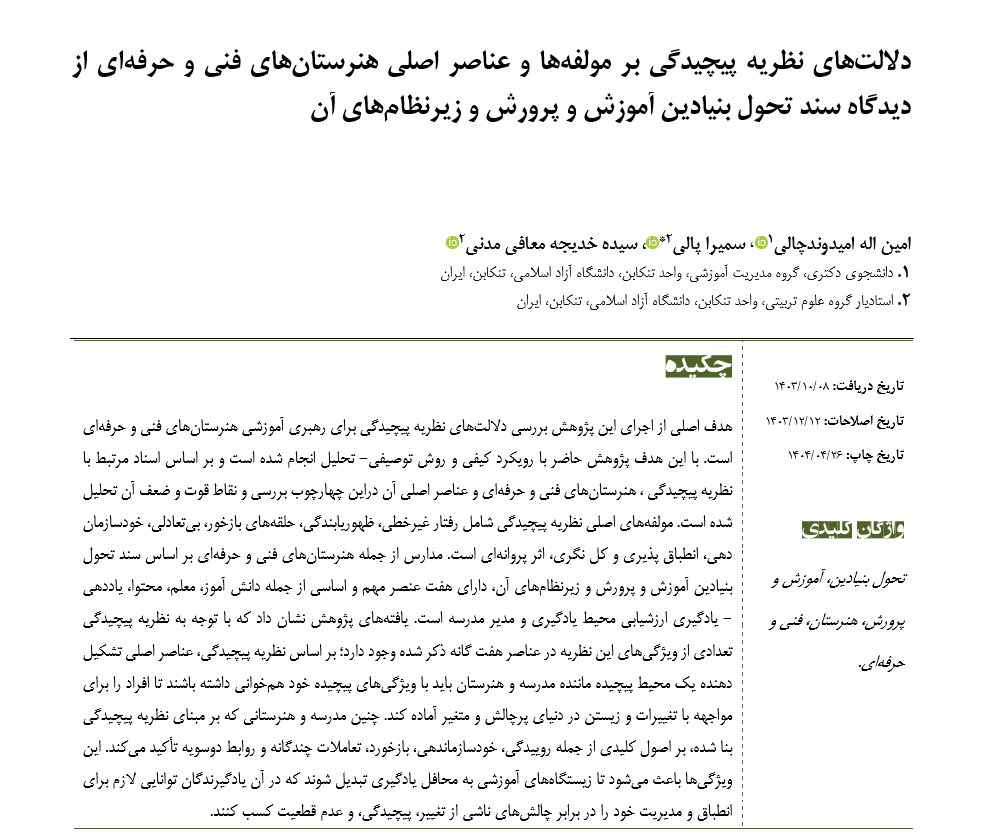Implications of Complexity Theory for the Components and Core Elements of Technical and Vocational Schools from the Perspective of the Fundamental Transformation Document of Education and Its Subsystems
Keywords:
Fundamental Transformation, Education, Technical and Vocational Schools, Vocational TrainingAbstract
The primary objective of this study is to examine the implications of complexity theory for educational leadership in technical and vocational schools. To achieve this goal, the present research has been conducted using a qualitative approach and a descriptive-analytical method. Based on documents related to complexity theory, technical and vocational schools, and their core elements, this study analyzes their strengths and weaknesses within this framework. The key components of complexity theory include nonlinearity, emergence, feedback loops, disequilibrium, self-organization, adaptability, holism, and the butterfly effect. Schools, including technical and vocational schools, based on the Fundamental Transformation Document of Education and its subsystems, consist of seven essential elements: students, teachers, content, teaching-learning, evaluation, learning environment, and school administrators. The findings of this study indicate that several characteristics of complexity theory are present in the aforementioned seven elements. According to complexity theory, the core components of a complex environment, such as schools and technical and vocational institutions, should align with complex features to prepare individuals for coping with changes and living in a highly challenging and dynamic world. A school or vocational institution built on the principles of complexity theory emphasizes key principles such as emergence, self-organization, feedback, multiple interactions, and reciprocal relationships. These characteristics transform educational ecosystems into learning communities where learners develop the necessary skills to adapt and manage themselves in response to challenges arising from change, complexity, and uncertainty.
Downloads
References
Ahanchian MR, Mohammadi C. The teachings of chaos theory in the education system and curriculum of experimental sciences in Iran. Quarterly Journal of Curriculum Studies. 2013;29:26-5.
Le Moigne JL, Edited by DL. Complexité [Complexity] Dictionnaire d'Histoire et philosophie des sciences [Dictionary of history and philosophy of science]: Quadrige Dicos Poche, Paris, France; 1996. 205-15 p.
Danayi Fard H. An inquiry into the philosophical foundations of complexity theory: Does the science of complexity have a postmodernist hue? Humanities Teacher, Special Issue on Management. 2006:210-171.
Landry M, Banville C. Characteristics et balises d'évaluation de la recherche systémique [Systemic research characteristics and benchmarks]. Revue troisienne des Sciences de Gestion. 2000;2(1):1-27.
Morrison K. Complexity theory and curriculum reforms in Hong Kong. Pedagogy, Culture and Society. 2003;11(2):279-302. doi: https://doi.org/10.1080/14681360300200174.
Cilliers P. Complexity and Postmodernism: Understanding Complex Systems: Routledge, London; 1998.
Frei R, Edited by Lenaerts MGHBPBMD, Doursat R. A complex systems approach to education in Switzerland. 2011.
Davis B, Sumara D. Complexity science and educational action research: Towards a pragmatics of transformation. Educational Action Research. 2005;13:453-64. doi: https://doi.org/10.1080/09650790500200291.
Davis B, Sumara D. Complexity and Education: Inquiries into Learning, Teaching, and Research2006.
Davis B, Sumara D, D'Amour L. Understanding school districts as learning systems: Some lessons from three cases of complex transformation. Educational Change. 2012;13(3):373-99. doi: https://doi.org/10.1007/s10833-012-9183-4.
Logachev MS, Orekhovskaya NA, Seregina T, Shishov S, Volvak S. Information System for Monitoring and Managing the Quality of Educational Programs. Journal of Open Innovation Technology Market and Complexity. 2021;7(1):93. doi: 10.3390/joitmc7010093.
Stacey RD. Complexity and management. Translated by A. H. Khaleghi ed: Scientific and Cultural Publications, Tehran; 2012.
Abzari M, Sattari Qahfarokhi M. Complexity theory and organizational change management. Management Journal. 2008;19(131-132):46-50.
Mohammadi Chaboki R. Complexity paradigm and philosophy of education. 2010:17-1.
Farshad M. Systemic perspective: Amir Kabir Publications, Tehran; 2013.
Pourshafaei H. A comparative application of systems analysis and thinking in organizational management. Controller Journal. 2006;41(21):97-73.
Kuhn TS. The structure of scientific revolutions. Translated by A. Taheri ed: Ghesseh Publications, Tehran; 2004.
Castillo-Martínez I, Ramírez-Montoya M, Torres-Delgado G. Reasoning for complexity competency instrument (e-complexity): Content validation and expert judgment. Cogent Education. 2024.
Gilead T. Conceptualizing distributive justice in education: a complexity theory perspective. Journal of Philosophy of Education. 2023;57(2):495-516. doi: 10.1093/jopedu/qhad030.
Nerlino E. Navigating “the chaos”: teacher considerations while adapting curriculum and instruction during the COVID-19 pandemic. Qualitative Research Journal. 2022;22(4):433-47. doi: 10.1108/QRJ-02-2022-0026.
Masnavi S, Soltani Fard H. The complex landscape and the complexity of landscape: Examining the role of complexity in the sustainability of ecological systems. Quarterly Journal of Environmental Sciences. 2006;4(2).
Al Suwailem S. Behavioural Complexity. Journal of Economic Surveys. 2011;25(3). doi: https://doi.org/10.1111/j.1467-6419.2010.00657.x.
Siemens G. Connectivism: A Learning Theory for the Digital Age. 2014.
Wood P, Butt G. Exploring the Use of Complexity Theory and Action Research as Frameworks for Curriculum Change. Journal of Curriculum Studies. 2014;46(5). doi: https://doi.org/10.1080/00220272.2014.921840.
Ford A. Modeling the Environment: Island Press; 2010.
Clarke A, Collins S. Complexity Science and Student Teacher Supervision. Teaching and Teacher Education. 2007;23(2). doi: https://doi.org/10.1016/j.tate.2006.10.006.
Bertuglia CS, Vaio F. Nonlinearity, Chaos and Complexity: The Dynamics of Natural and Social Systems: Oxford University Press; 2005.
Lorenz EN. The Essence of Chaos: University of Washington Press; 2005.
Gleick J. Chaos: Making a new science: Penguin Books, New York; 1987.
Deborah PB. Complexity, Chaos, and Nonlinear Dynamics: A New Perspective on Career Development Theory. The Career Development Quarterly. 2005;53:194-207. doi: https://doi.org/10.1002/j.2161-0045.2005.tb00990.x.
Byrne D. Complexity theory and the social sciences: London and New York; 1999.
Gros C. Complex and Adaptive Dynamical Systems: Springer; 2010.
Dalmedico DA, Edited by MN. Chaos, disorder, and mixing: A new fin-de-siècle image of science? Growing Explanations: Historical perspectives on recent science: Duke University Press, London; 2004. 67-94 p.
Kauffman SA. At Home in the Universe: The Search for the Laws of Complexity1995.
Hattie J, Timperley H. The Power of Feedback. 2007. doi: https://doi.org/10.3102/003465430298487.

Downloads
Published
Submitted
Revised
Accepted
Issue
Section
License
Copyright (c) 2025 Aminollah Omidvandchali (Author); Samira Pali (Corresponding author); Seyedeh Khadijeh Moafimadani (Author)

This work is licensed under a Creative Commons Attribution-NonCommercial 4.0 International License.










